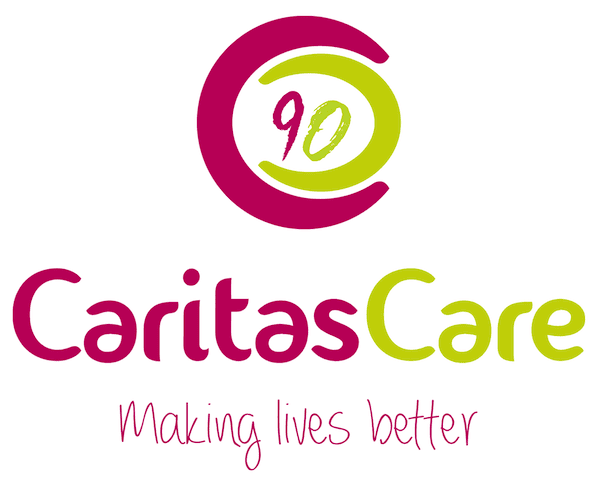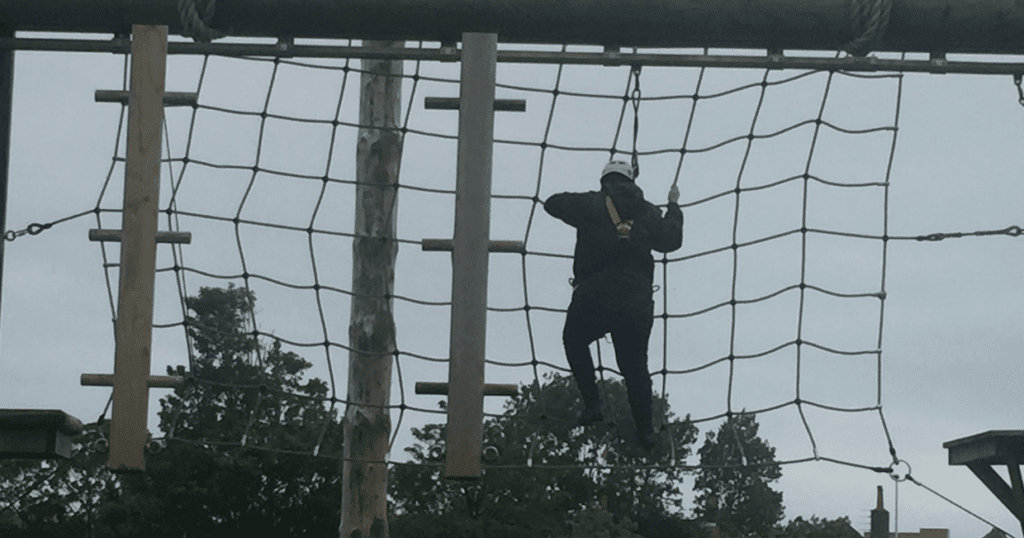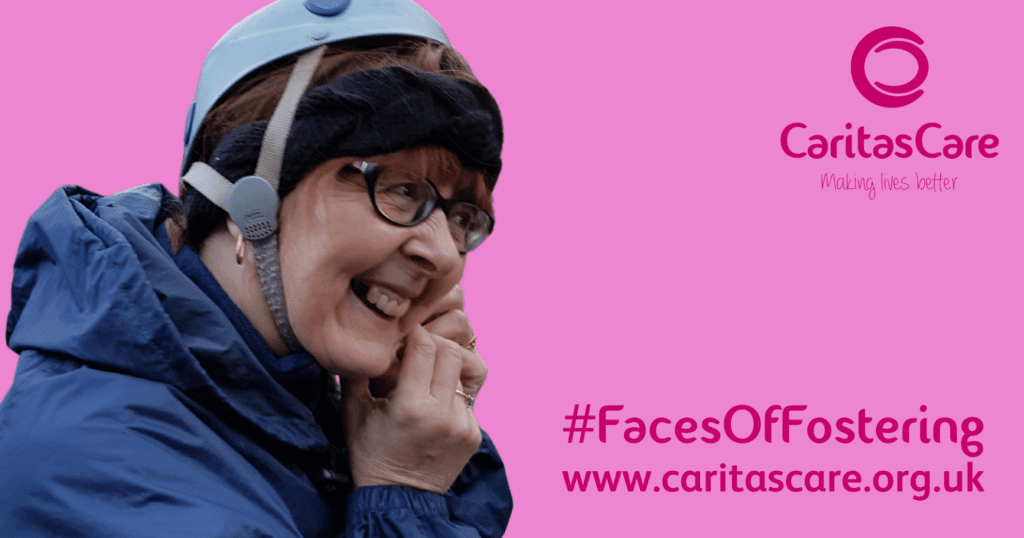Caritas Care’s children’s activities are fun for all birth children and foster children together.
Caritas Care provides fantastic support for their foster carers and children; a part of this support is the play activities that all children, whether birth or foster, are involved in.
The activities we run are with all the children mixed in together. It is great to see the children learning to socialise with each other. Often, friendships develop. Consequently, with the support and encouragement of myself and the team, the children participate as friends.
Pictured: Sharon isn’t shy of joining in on activities. Here she is on a recent high rope activity.
Generally, our activities are held in school holidays and are community-based. We have been to theme parks and outdoor activity centres and things like roller skating and bowling. Earlier this year, we ran craft activities on Team or Zoom with the children due to the pandemic. We split them up into two groups, one team under 11 and the other over 11. We organised Arts and Crafts and other fun activities to send everything the children needed beforehand; hence, we were ready to go on the day. We had a great turn out on each team, and the feedback was positive. This reaction was good because we usually would have all been together in person. Still, it was the only way we could get together, and the children loved it, especially springtime bingo. I have been going out and about on visits to the children to deliver Easter eggs and continue, wherever possible, a semblance of normality that wouldn’t be detrimental to them.
I work with new children to communicate through play and help build up trust.
When we have new children, who are either new foster children or birth children of new foster carers, I may work exclusively with them. We have recently had three boys who came to us and who were not in school; initially, I would take them out for long walks, talk to them about the team and how we may be present in their lives. Taking the children out also gives the foster carer a bit of respite and helps the children feel that they are a part of us; also, they can just go out and play and be children. The children have the freedom to have a chat with me if they want, but we don’t push this. Some do, and some don’t. It can take time to develop a level of trust, and we are fortunate to afford this time for our children and families.
Richard Rose – Therapeutic Life Story Work; Understanding children’s behaviour.
We offer therapeutic life story work with the children; many children have life storybooks that give them early years information. Therapeutic life story work explores directly with the child and their carer and helps us understand their perceptions. It also allows the child to know where information comes from and validate and explore their memories. Thus we look at how we all have different views and recollections on things in our lives. It is a substantial piece of work, and children often give a lot in these sessions; however, it helps children work through their lived early experiences.
Consequently, the children connect to presented behaviour and are more able to engage in other therapeutic support and form stronger attachments with their carers and others around them. I have used my training from Richard Rose Life Story Therapy to utilise it in children’s play activities and therapy. Professor Richard Rose – Child Trauma Intervention Services: Child Trauma Intervention Services
When I visit, I am Sharon, who sees the children; I am not there for the grown-ups!
When I visit, I am there exclusively for the children, so our sessions need to build on understanding and trust. Initial visits may need a parent or carer present; however, we offer the children their sessions to be open and share things where possible. They see me as part of the foster team, but I am there for them rather than their parent or carer.
We have one little girl at the moment who loves it when her foster team come to visit her because when she sees me, she knows I am there just to see her. It is nice that the children feel included by having their unique person.
I enjoy writing poetry; I find it therapeutic. I have done this for many years. Sometimes, I will write things down in verse about my own life experiences, for example, grief or loss. Verse and poetry help me to convey my feelings, and I find them very therapeutic. I also write funny ones for when someone gets married, or we have staff that are leaving. I like the humour from my poems, too; I find that lyrics help explain a life journey better.
Read Sharon’s poem on supporting children in foster care HERE
For some of our children, expressing themselves through talking directly to someone can be tricky; therefore, I might suggest poetry, drawing etc., as an outlet. Some of our children and young people have trauma therapy, art therapy or even animal therapies.
Direct work for children
For some of the children, there are areas of direct work implemented. I support young people with work areas to include recognising feelings, awareness of a child’s needs, staying safe, and other areas of need. Through these sessions, we use both play and a lot of visual support. Something as basic as using a bottle of Pepsi Max to show a child the feelings they may have had, especially when trauma has been a factor in their lives. The children can see how things get “shook up”, and it can be compelling and effective for them. As you can tell, the pandemic has meant I have been working from home and have had to get a bit creative with my drawing skills!
Caritas Care respect birth children as part of the fostering process.
Working with birth children and being guided by them enables children to realise that now is the right time for fostering. We acknowledge the birth children rather than the foster child to respect their voice to safely explore their thoughts and feelings.
One of the birth children from our fostering families is Cameron; he has grown into fostering as a way of life. Cameron has matured into a lovely young man; he is always kind and understanding. As a result of fostering, Cameron has made a big difference in the lives of children who became part of his family.
Supporting Family time is vital.
Over time, we start to understand each child’s personality, and by sharing experiences, we get to know them as children. Throughout the pandemic, we have, wherever possible, been supporting family time. Early in the pandemic, some children could not have contact in person; we ensure we always maintain to get it for them. As a result, we have become creative through WhatsApp; we have become limited to visits taking place outdoors for direct family time. We mainly go to the local park, and often it has been freezing and wet. Most importantly, we have ensured that children continue to see their families directly.
It is equally essential for new children to see that we always support family time. Sometimes the parents may feel wary and untrusting as they don’t know me; however, we begin to get on, and over time they begin to build that trust. They know I am not there to criticise or judge them; my job is to promote the time they have with their children and to give them the best family time together.
We are helping children to understand their Journey through Therapeutic Life Story Work
When undertaking therapeutic life story work with the children, we also explore their parent’s own childhood experiences. Wherever possible, I will meet with the birth parents, explain the process and ask questions about their upbringing and early information about their child.
With the children, we look at what babies and children need to be safe and healthy and explore whether they had these things and whether their parents had these things. We can consider the choices adults have made and the factors that may have driven these choices, and the outcomes.
This process does not invalidate the experiences and trauma the child has lived through. However, it helps children process why some things may have happened whilst still recognising the trauma and impact of their early experiences.
‘Look at your Mummy and Daddy’ helps a child understand themselves, parents, and Grandparents and ask what babies need? What do children need? Sadly, this is important because some families don’t know how to nurture as it may never have been shown to them.
You can read more stories from Sharon HERE
Click here to enquire about fostering with Caritas Care
Rated Outstanding by Ofsted.
Special thanks to Verve Recruitment for their support in helping us find more foster carer for more children







